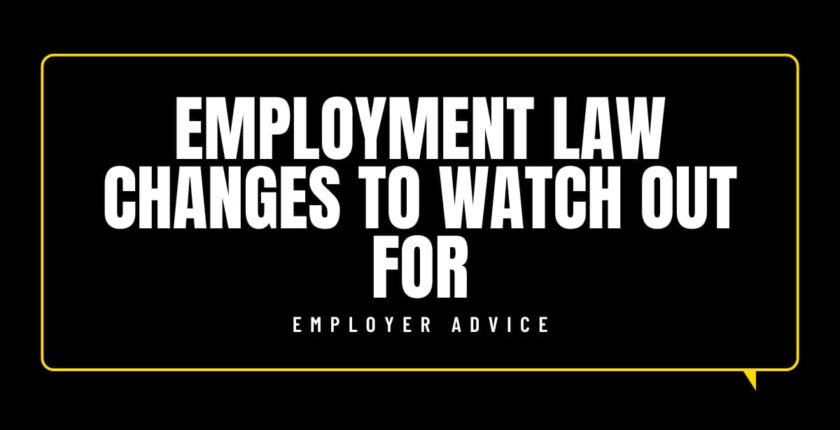Employment Law Changes To Watch Out For
Employment Law in the UK hasn’t escaped the changes 2024 has brought.
The new Labour government have suggested some interesting employment law concepts. So, what has changed and how will the new employment laws in the UK affect businesses?
What has changed and why?
I wanted to start by talking about what employment laws have changed in 2024 and why. The changes aim to make the laws more applicable to modern lifestyles, with a focus on greater protection for employees and ensuring fair compensation.
There are quite a few employment law changes. Here’s an overview of the ones that we’ve found will impact you:
Increased National Minimum Wage
From April 2024, the National Minimum Wage saw significant increases across all age groups, including a rise to £11.44 per hour for workers aged 21 and over.
There are also discussions about moving towards a real living wage by removing the age brackets and changing the remit of the independent Low Pay Commission.
Changes to Flexible Working
Now, employees can make two flexible working requests in a year, and they can do so from day one! Employees also no longer have to explain the impact of flexible working.
However, the permitted reasons for rejecting a request haven’t changed.
Increased Flexibility for Paternity Leave
Under this change, statutory paternity leave offers a few options for new dads:
- A single period of one week
- A single period of two weeks
- Two non-consecutive one-week periods
This leave can now be taken within the first year – not just the first 8 weeks after birth/adoption. But new dads will need to give 28 days’ notice for each week of leave (instead of 15 weeks’ notice). They must also inform their employers 15 weeks before the expected birth date or adoption.
Protection from Redundancy
This change focuses heavily on pregnant employees and new parents.
Now, the enhanced protection from redundancy has been extended. The period of protection starts from the moment an employer is notified of the pregnancy until 18 months after birth/adoption.
However, if there is no appropriate vacancy available, redundancy can still occur.
Updates to Carer’s Leave
If an employee has caring responsibilities, they can take one week of unpaid leave a year.
The requirements for this are quite specific: it must be a dependent, and the care needs to be due to:
- Disability
- Old age
- Illness or injury that will require 3 months of care
Updates to Holiday Pay
For employees who have irregular hours, holiday pay can be calculated at a rate of 12.07% of their pay.
This change addresses previous anomalies and allows employers to pay “rolled-up” holiday pay along with regular wages.
Other Interesting Employment Law Changes
The Make Work Pay plan that is rolling out will also update employment laws. This will include changes to:
- Ban zero-hour contracts
- End fire and rehire practices
- Implement a status of ‘Worker’
- The right to switch off
- Commitments around health and safety
- Updates on TUPE
How Does Employment Law Changes Impact Businesses?
You’ll have to make some changes in your business due to these updates, with smaller businesses feeling the pinch more than others.
These are the 3 biggest impacts we think will affect you the most:
1
Your Introduction
Always start with a polite greeting and be professional. If you can, it’s a good opportunity to initially thank the interviewer for the opportunity. For bonus points, you can even throw in some of your research! E.g., “Hello, I’m Jane, and thank you for meeting with me today. I’m excited to learn more about the company, particularly X services, and how I might fit in here.”
2
Attitude
Don’t let your confidence turn into arrogance. Even the best of the best will work from the moment the interview starts until the end – even if they’re 99% sure they’ve got the job. A sales interview is a fantastic opportunity to show off your Active Listening skills as well – so make sure you use this.
3
How You Close
Make sure you finish as strong as you started. If you feel like it’s gone well, ask the interviewer if they have any initial reservations that you can address. Also, be proactive and ask what the next steps are!
What’s Next for Employment Law in the UK?
The updates to employment law in 2024 are just the beginning, with the Make Work Pay bill potentially bringing even more transformative changes. Considering the shifts we’ve seen so far, do you think this bill will achieve its objectives? We’d love to hear your perspective.
Do you think the Make Work Pay bill is achievable? Let us know!
Extra resources for you to look at
If you want to find out more, here are a bunch of great articles that talk about changes to employment law in the UK:
- Labour’s Plan to Make Work Pay: Is The Right To Switch Off Achievable? An Article, by People Management.
- Business leaders and unions to work hand in hand to deliver new plans to Make Work Pay. A Press Release from the Gov.UK website.
- Make UK are running a series of training sessions for manufacturers – book online today!
The Experts Behind This Blog
This has been an interesting blog to write, as a collaborative effort between our marketing team and our Compliance Manager.
Our Compliance Manager, Vlada Ratcliffe, handles our internal contracts and advises our upper management on employment law.


